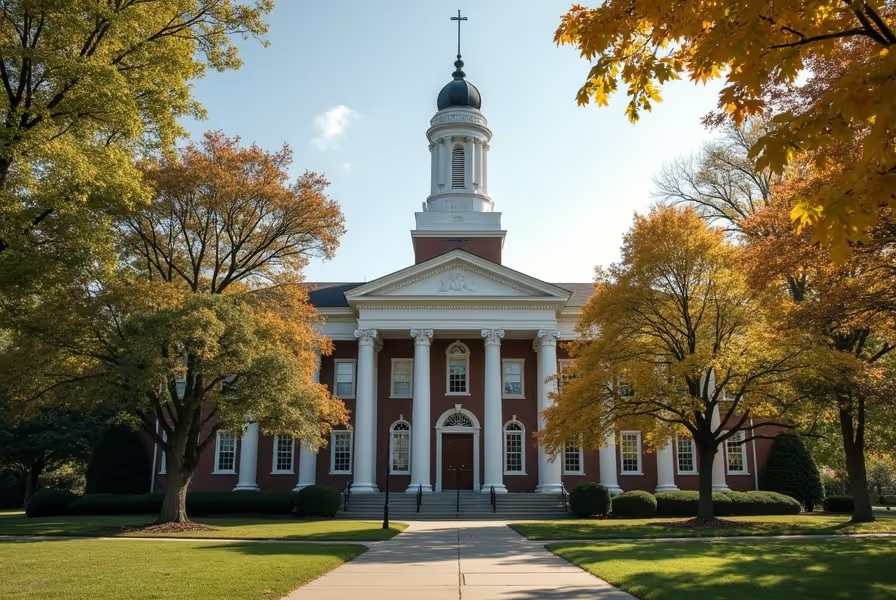Deep Connections Forged Through Faith-Based Education
Choosing a college is more than selecting a place to study. It's about finding a community where you belong. At Christian colleges, community plays a central role in shaping both academic and personal experiences. These institutions aren't just about earning a degree—they are about forming lifelong bonds built on shared faith, values, and purpose.
Christian colleges offer something unique: a supportive environment where spiritual growth, academic excellence, and personal development go hand in hand. Here’s how these institutions help build lasting connections that reach far beyond graduation day.
Faith-Driven Community Makes a Difference
Christian colleges create a sense of belonging grounded in shared beliefs. The community isn’t just friendly—it’s spiritually united. Daily life on campus often includes prayer groups, chapel services, and faith-based service activities that invite students to connect with others on a deeper level.
These shared experiences naturally lead to strong friendships and mutual support. You aren’t just meeting classmates—you’re joining a faith family that cares for your well-being, encourages accountability, and walks alongside you during life’s challenges.
What Makes the Christian College Experience Unique?
Several characteristics set Christian higher education apart when it comes to building lasting bonds:
- Shared Values: Students bond over common moral and ethical perspectives, fostering trust and understanding.
- Small Class Sizes: With more personal interactions, you build deeper connections with professors and peers.
- Service Opportunities: Group mission trips, volunteer work, and outreach events create unity through shared purpose.
- Faith Integration: Curriculum and campus life support spiritual maturity and community awareness.
These unique features make Christian colleges ideal places for students to form enduring relationships that continue into adulthood.
Living and Learning in a Supportive Christian Environment
Campus living plays a large role at most Christian colleges. Dorm life includes regular Bible studies, worship nights, and mentoring relationships. These programs encourage ongoing dialogue, emotional support, and spiritual growth.
You’ll find that your peers quickly become like family. Whether it’s late-night study sessions, shared meals, or conversations about faith and purpose, lasting moments happen often. The bonds formed here carry into life after college—with roommates becoming lifelong friends, ministry teammates, and even business partners.
How Christian College Faculty Foster Mentorship
Professors at Christian colleges often go beyond their teaching roles. Many serve as mentors and spiritual guides, investing in your academic and personal journey. Their goal is not just to educate but to cultivate character and leadership in each student.
This nurturing environment helps you feel seen and valued. It enables you to grow in confidence as well as knowledge. As a result, many students return to their alma mater for guidance and support long after graduation.
Why Alumni Relationships Matter at Faith-Based Institutions
Christian colleges tend to maintain strong alumni networks. Because of the close-knit campus experience, graduates often stay connected—and are eager to give back. These alumni networks offer:
- Professional mentorship and job leads
- Prayer and peer support groups
- Opportunities for service or mission collaboration
- Reunions and community groups across the country
Through alumni events and faith-based networking, graduates continue to benefit from—and contribute to—their college community for years.
How Do Christian Colleges Build Community for Life?
The formula for lifelong community is simple but powerful: shared faith, intentional relationships, and commitment to growth. At a Christian college, you’re not left to find your way alone. You’re guided, supported, and inspired—each step of your journey.
Programs such as peer mentorships, leadership retreats, service trips, and ministry teams all strengthen relationships. These opportunities shape students spiritually, emotionally, and socially—creating solid foundations for lifelong friendships and partnerships.
FAQs About Community Life at Christian Colleges
What types of student communities exist at Christian colleges?
Christian colleges offer groups such as prayer circles, worship teams, Bible study groups, student ministries, and mission teams. These groups create spaces to connect with others who share your values and goals.
Do Christian colleges support students from different denominations?
Yes. While some campuses reflect a specific denomination, most Christian colleges welcome students from all Christian backgrounds. They focus on what unites rather than divides, encouraging respectful and inclusive conversations.
How do Christian colleges encourage spiritual growth?
You’ll find chapel services, spiritual mentors, theology courses, and regular opportunities for faith discussion. Many schools also incorporate Christian principles into their academic approach and campus culture.
Can I build strong friendships even as a transfer or commuter student?
Absolutely. Christian colleges usually have dedicated outreach programs to ensure every student feels connected. Whether through small groups, social events, or campus ministries, you’ll have ample opportunities to build community.
The Long-Term Impact of a Christ-Centered Community
Attending a Christian college equips you with more than academic knowledge. It surrounds you with enduring support, deep relationships, and spiritual encouragement that last far beyond your college years. These connections often lead to lifelong friendships, mentorships, marriage, ministry partnerships, and professional collaboration.
When you experience community at this level, it shapes who you become and how you live. A Christ-centered community isn’t just for your college years—it helps lay the foundation for a purposeful, connected life rooted in faith.
Start Building Your Lifelong Community Today
If you’re searching for a college experience marked by deep relationships, shared purpose, and spiritual growth, consider a Christian college. The friendships you form and the community you build will not only shape your education—they will impact your entire life.















.svg)



